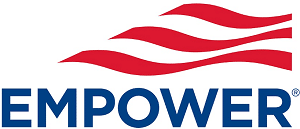Editorial Note: We earn a commission from partner links on Doughroller. Commissions do not affect our authors’ or editors’ opinions or evaluations. Learn more here.
Saving money is difficult. The instant gratification of spending can be the siren song that runs our finances aground. The best savings apps can help us save money by automating the process.
While the benefits of automation vary, studies have demonstrated that automating savings can help people save money. The trend in microsavings and round-up financial technology apps makes growing a nest egg more attainable for everyone. Here’s a breakdown of the best round-up, automated savings, and microsavings apps, so you can select the best platform and method for your savings goals.
The Best Savings Apps
| Savings App | Best For |
|---|---|
| Chime | High APY on savings |
| Acorns | Investing your roundups |
| Empower | Flexible meeting weekly savings goals and Cash Advance |
| Oportun | Regular savings bonuses |
| Qapital | Integrating with other apps for punishment/reward savings |
Chime
Chime goes far beyond the benefits of a simple savings app. It is a financial technology company whose mission is to provide monetary services that are “helpful, easy, and free”. In addition to its award-winning financial app, Chime also offers a Spending Account, a Credit Builder Account, and a Savings Account. Each type of account includes automated savings features to empower small savers. The moment you open an account with Chime, you’re already saving thanks to their no monthly fee and no-minimum policies.
Once your account is set up, you’ll have the option to open a round-up savings feature, which instantly transfers change up to the dollar into a designated savings account after every purchase. You’ll have instant access to these savings if an emergency arises. If hard times cause your account to be overdrawn, Chime extends mercy to its users with a no-fee overdraft policy.
Chime makes it possible for you to save the moment a payment hits your account by using the automated paycheck savings system. It transfers a designated portion of your paycheck into the savings account. With your Chime savings account steadily increasing over time, you’ll also benefit from earning interest on the funds you have saved. The current rate is 2.00% APY.
“The Annual Percentage Yield (“APY”) is variable and may change at any time. The disclosed APY is accurate as of May 22, 2023. No minimum balance required. Must have $0.01 in savings to earn interest.”
“Round Ups automatically round up debit card purchases to the nearest dollar and transfer the round up from your Chime Checking Account to your savings account.”
“Save When I Get Paid automatically transfers 10% of your direct deposits of $500 or more from your Checking Account into your savings account.”
“Chime is a financial technology company, not a bank. Banking services provided by The Bancorp Bank, N.A. or Stride Bank, N.A., Members FDIC.”
Acorns
Acorns takes the concept of autosaving and adapts it to automated investing. For a flat rate of $3 or $5 per month, you have the potential to earn more from your spare change through investment strategies than compared to the return you’ll get from a savings account APY. Of course, it’s important to note that there’s inherent risk in any stock market deal.
However, Acorns aims to mitigate the risk as much as possible by creating expert-designed, smart portfolios tailored to each user. Every dollar invested by an Acorns user is automatically diversified across more than 7,000 stocks and bonds in their exchange-traded funds. So you’ll avoid putting all your hard-earned nuts in one stash, making it easier to manage stock market volatility.
The Acorns model works exactly the same as other round-up micro-investment strategies. After every purchase, your spare change to the next dollar is automatically transferred into your Acorns account. Users can also decide if they would like to deposit daily, monthly, or weekly investments as well as how conservative or aggressive their portfolio investments operate.
Oportun

For savers who are more visually motivated, the Oportun app organizes your unique savings goals into an appealing design layout. Whether you’re setting aside money for college tuition, a vacation getaway, or a 3-month financial cushion, Oportun allows users to define what personal financial wellness means to them and track their progress toward each objective.
Saving is hard, but Oportun helps make it a little easier by providing monetary incentives to consistent savers. After three consecutive months of savings, a bonus equal to 0.10% of annual savings is automatically deposited into your Oportun account. Keep in mind, that this savings tool charges users $5 per month to operate, so aim to put aside at least more than the app costs.
Oportun stands out among the autosavings applications because of its specialized savings algorithm. For the user who truly wants a hands-off approach to passive saving, this can be an ideal platform. Oportun accounts for your spending habits, bills, account balance, and predicted income to determine how much money to transfer to savings. The amount will likely change every month, but savers can rest assured that Oportun is designed to prevent overdrafts.
Empower
Empower studies your financial activity on a daily basis and takes the guesswork out of how much to spend and save for your weekly budget. Users can set a weekly savings goal, and the Empower AutoSave feature will analyze if your spending habits leave room to achieve your savings goals. If you have the extra cash in your account, the app will transfer up to four times a week to meet your ideal savings amount.
Empowers greatest distinction lies in its integration of user-preferred savings goals coupled with the technology’s ability to set aside money at the optimal time. When emergencies or extra spending creep up, the app will notice the spike in expenditures and will only transfer what’s safely allowed for your budget. This is a perfect platform for the realistic planner who knows their weekly budget goals but also wants to account for weeks with higher-than-usual spending, such as around the holidays.
However, despite best efforts to save, Empower recognizes that life happens and sometimes you may need fast cash to tide you over to your next paycheck. Get peace of mind with Empower Cash Advance which gives you access to up to $250^ with no interest, no late fees, and no risk to your credit.
Qapital

Qapital is a financial technology company that focuses on the human side of savings. By building its savings technology around human behavioral psychology, Qapital aims to maximize savings for the future without making you miserable in the now.
Like other savings platforms, Qapital has built-in features like autosavings that pull from every paycheck. However, what truly separates Qapital from the fintech pack are their user-controlled Rules.
Rules operate on an IFTTT basis (If This Then That). You can link your Qapital account to a number of apps, including Facebook, Uber, and Fitbit, among others. Depending on your Rule, you might reward yourself with a little savings bump every time you hit your Fitbit steps goal for the day.
On the other hand, you could dole out punishment for spending too much time on social media by automatically saving every time you post to Facebook. Tapping into our behavioral consciousness to contribute to savings appears to work. Users who utilize the IFTTT rules save nearly twice as much as Qapital users who only use the traditional autosavings feature.
Frequently Asked Questions (FAQ)
What is APY?
APY (annual percentage yield) sounds similar to APR (annual percentage rate), but the two use different formulas for determining annual interest. APR is generally associated with interest on debt, while APY factors in compounding on the interest in a savings or other deposit account.
How much can I expect to save using a savings app?
Many personal factors will determine how much microsavings and round-up apps will bolster your future fortune. Your income, spending, and how frequently you use the user-controlled rules and features will create variances in savings results from user to user. However, some microsavings technology companies share their users’ annual savings. The average Qapital user, for instance, saves $6,000 per year.
What’s the benefit of autosaving and microsaving methods when compared with a traditional, manual savings plan?
Other than convenience, autosavings and microsavings are more suitable for the way our brains make decisions about saving money. While we like to think of ourselves as rational beings, a growing body of research shows that our mood, stress levels, and attitude about the future all influence how much we do or don’t save.
The autosaving and microsavings methods spare us the mental torment and help us stick to a savings plan in a truly hands-off way.
How We Came Up with This List
When considering the best savings apps, we sought out platforms offering more creative ways to save while still offering a competitive APY. These factors are important because the point of microsaving is to make saving money as efficient as possible for the user, and, of course, we want your accumulated saved money to offer you the highest possible return.
Many budgeters may preemptively determine that there’s just no room for savings in their budget. We focused on the apps that make wealth accumulation possible, and easy, for everyone.
Final Thoughts
The peace of mind that comes with a padded savings account can not be overstated. Whether you put your funds toward practical living expenses or an indulgent purchase, everyone could use a boost to their savings account.
These round-ups, automated savings, and microsavings apps are tools that make growing a savings fund a possibility for people in any budget range. With the ability to automatically set aside a feasible amount today, these apps can help make our lives a little more secure in the future.
Read More:





